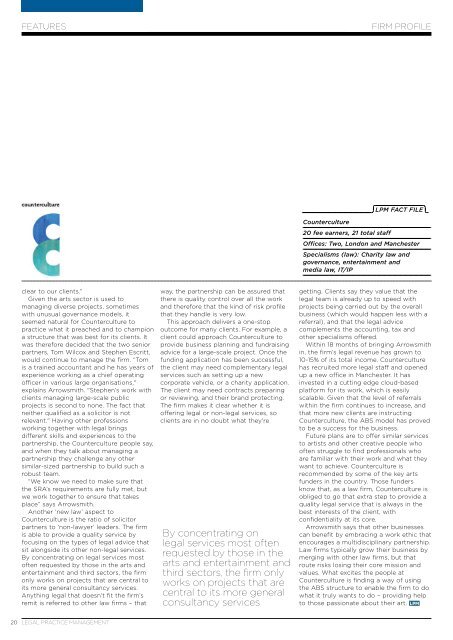LPM
LPM_APR_FINAL
LPM_APR_FINAL
Create successful ePaper yourself
Turn your PDF publications into a flip-book with our unique Google optimized e-Paper software.
FEATURES<br />
FIRM PROFILE<br />
APRIL 2016<br />
Counterculture<br />
20 fee earners, 21 total staff<br />
<strong>LPM</strong> FACT FILE<br />
Offices: Two, London and Manchester<br />
Specialisms (law): Charity law and<br />
governance, entertainment and<br />
media law, IT/IP<br />
clear to our clients.”<br />
Given the arts sector is used to<br />
managing diverse projects, sometimes<br />
with unusual governance models, it<br />
seemed natural for Counterculture to<br />
practice what it preached and to champion<br />
a structure that was best for its clients. It<br />
was therefore decided that the two senior<br />
partners, Tom Wilcox and Stephen Escritt,<br />
would continue to manage the firm. “Tom<br />
is a trained accountant and he has years of<br />
experience working as a chief operating<br />
officer in various large organisations,"<br />
explains Arrowsmith. "Stephen’s work with<br />
clients managing large-scale public<br />
projects is second to none. The fact that<br />
neither qualified as a solicitor is not<br />
relevant." Having other professions<br />
working together with legal brings<br />
different skills and experiences to the<br />
partnership, the Counterculture people say,<br />
and when they talk about managing a<br />
partnership they challenge any other<br />
similar-sized partnership to build such a<br />
robust team.<br />
“We know we need to make sure that<br />
the SRA’s requirements are fully met, but<br />
we work together to ensure that takes<br />
place” says Arrowsmith.<br />
Another 'new law' aspect to<br />
Counterculture is the ratio of solicitor<br />
partners to ‘non-lawyer’ leaders. The firm<br />
is able to provide a quality service by<br />
focusing on the types of legal advice that<br />
sit alongside its other non-legal services.<br />
By concentrating on legal services most<br />
often requested by those in the arts and<br />
entertainment and third sectors, the firm<br />
only works on projects that are central to<br />
its more general consultancy services.<br />
Anything legal that doesn't fit the firm’s<br />
remit is referred to other law firms – that<br />
way, the partnership can be assured that<br />
there is quality control over all the work<br />
and therefore that the kind of risk profile<br />
that they handle is very low.<br />
This approach delivers a one-stop<br />
outcome for many clients. For example, a<br />
client could approach Counterculture to<br />
provide business planning and fundraising<br />
advice for a large-scale project. Once the<br />
funding application has been successful,<br />
the client may need complementary legal<br />
services such as setting up a new<br />
corporate vehicle, or a charity application.<br />
The client may need contracts preparing<br />
or reviewing, and their brand protecting.<br />
The firm makes it clear whether it is<br />
offering legal or non-legal services, so<br />
clients are in no doubt what they're<br />
By concentrating on<br />
legal services most often<br />
requested by those in the<br />
arts and entertainment and<br />
third sectors, the firm only<br />
works on projects that are<br />
central to its more general<br />
consultancy services<br />
getting. Clients say they value that the<br />
legal team is already up to speed with<br />
projects being carried out by the overall<br />
business (which would happen less with a<br />
referral), and that the legal advice<br />
complements the accounting, tax and<br />
other specialisms offered.<br />
Within 18 months of bringing Arrowsmith<br />
in, the firm’s legal revenue has grown to<br />
10-15% of its total income. Counterculture<br />
has recruited more legal staff and opened<br />
up a new office in Manchester. It has<br />
invested in a cutting edge cloud-based<br />
platform for its work, which is easily<br />
scalable. Given that the level of referrals<br />
within the firm continues to increase, and<br />
that more new clients are instructing<br />
Counterculture, the ABS model has proved<br />
to be a success for the business.<br />
Future plans are to offer similar services<br />
to artists and other creative people who<br />
often struggle to find professionals who<br />
are familiar with their work and what they<br />
want to achieve. Counterculture is<br />
recommended by some of the key arts<br />
funders in the country. Those funders<br />
know that, as a law firm, Counterculture is<br />
obliged to go that extra step to provide a<br />
quality legal service that is always in the<br />
best interests of the client, with<br />
confidentiality at its core.<br />
Arrowsmith says that other businesses<br />
can benefit by embracing a work ethic that<br />
encourages a multidisciplinary partnership.<br />
Law firms typically grow their business by<br />
merging with other law firms, but that<br />
route risks losing their core mission and<br />
values. What excites the people at<br />
Counterculture is finding a way of using<br />
the ABS structure to enable the firm to do<br />
what it truly wants to do – providing help<br />
to those passionate about their art. <strong>LPM</strong><br />
20 LEGAL PRACTICE MANAGEMENT


